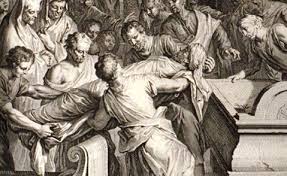Isaac Died and His Sons Esau and Jacob Buried Him
35: 27-29
Since Jacob’s departure from Beersheba to Haran, Isaac’s family had moved back to Hebron where David would one day be anointed king over Isra’el (Second Samuel 5:3). Jacob (Hebrew: Ya’akov) came home to his father Isaac in Mamre, near Kiriath Arba (that is Hebron) where Abraham and Isaac had stayed (35:27). He had visited his father several times during the ten years since he returned from Haran, but now his entire household had come home with him. His children and his wives would have been very eager to see and hear the head of the family that they had heard about their entire lives.
Isaac (Hebrew: Yitz’chak) lived to be one hundred and eighty years of age (35:28). He actually lived twelve more years after Jacob returned to him. Yitz’chak was still living when Jacob thought Joseph had been lost to a wild animal, although in reality, he had been sold into slavery in Egypt (to see link click Jb – When Midianite Merchants Came by, His Brothers Sold Joseph for Twenty Shekels of Silver). But Moses, under the inspiration of God the Holy Spirit, found it appropriate to mention Isaac’s death here.
Then he breathed his last and died and was gathered to his people, old and full of years. Although not much is said about it in Genesis, the patriarchs did believe in life after death. Isaac’s spirit, no doubt, was transported to Sh’ol, where the spirits of Shem, Noah, Abraham and other righteous of the TaNaKh were resting and waiting for the redemption and resurrection (Luke 16:19-31; Ephesians 4:7-10).

It is noteworthy that his sons Esav and Ya’akov buried him (35:29). They were still in fellowship with each other many years after their first reunion. Coming together once more, they participated in the burial ceremony of their father. Yitz’chak was buried in the same sepulcher with Rebekah, Abraham and Sarah, in the cave in Ephron’s’ field in Machpelah that Abraham had purchased near Mamre, which is actually in Hebron (23:17-20).542 We do not have any record that the two brothers ever saw each other again. Isaac’s death is only reported here in order to end this toldot. That is not what happens chronologically, but in keeping with the purpose of Genesis, one person’s story is ended so another person’s story can begin.
Isaac died at the time that Yosef was elevated to second in command of Egypt (see Jv – Joseph as Prime Minister), never learning that Joseph was still alive in Egypt. So Yitz’chak died about ten years before Jacob moved to Egypt. With the summary of Jacob’s family and the death of Isaac, the story of Ya’akov comes to an end. But before proceeding to the account of what becomes of Jacob, namely Joseph, Moses, under the inspiration of the Holy Spirit, first disposes of the non-seed line of Esau.
Jacob suffered four devastating blows in Chapter 35. Deborah, who had cared for him from the time he was born dies (35:8), Rachel, his beloved wife dies (35:19), Reuben, his firstborn son tries to seize his father’s position and violates one of his concubines (35:22a), and Isaac, his father, dies (35:29). It was a great period of adversity and suffering for Ya’akov, and as we live our lives we will suffer similar adversity as well. Jesus said: Your Father in heaven causes His sun to rise on the evil and the good, and sends rain on the righteous and the unrighteous (Matthew 5:45). But unlike those without faith in Yeshua, no matter how severe the burden, there is one thing the believer can count on. Suffering will never destroy the child of God. It cannot and will not claim victory over the godly. As Rabbi Sha’ul so eloquently said: Who will separate us from the love the Messiah? Trouble? Persecution? Hunger? Poverty? Danger? War? As the New Testament puts it, “For your sake we are being put to death all day long, we are considered sheep to be slaughtered.” No, in all things we are super conquerors, through the One who has loved us. For I am convinced that neither death nor life, neither angels nor other heavenly rulers, neither what exists nor what is coming, neither powers above nor powers below, nor any other created thing will be able to separate us from the love of God which comes to us through the Messiah Yeshua, our Lord (Romans 8:35-39).



Leave A Comment